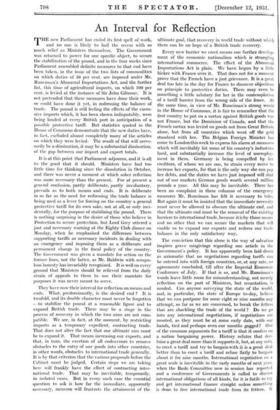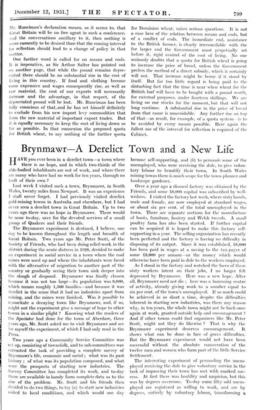An Interval for Reflection
THE new Parliament has ended its first spell of work, and no one is likely to hail the recess with so much relief as Ministers themselves. The Government was returned to power for one specific object, to secure the stabilization of the pound, and in the four weeks since Parliament assembled definite measures to that end have been taken, in the issue of the two lists of commodities on which duties of 50 per cent. are imposed under Mr. Runciman's Abnormal Importations Act, and the further list, this time of agricultural imports, on which 100 per cent. is levied at the instance of Sir John Gilmour. It is not pretended that these measures have done their work, or could have done it yet, in redressing the balance of trade. The pound is still feeling the effects of the exces- sive imports which, it has been shown indisputably, were being landed at every British port in anticipation of a possible protective tariff. But statistics quoted in the House of Commons demonstrate that the new duties have, in fact, excluded almost completely many of the articles on which they were levied. The result of that will neces- sarily be a diminution, it may be a substantial diminution, of the gap between our import and export totals.
It is at this point that Parliament adjourns, and it is all to the good that it should. Ministers have had too little time for thinking since the dissolution in October, and there was never a moment at which sober reflection was more necessary than the present. For at present a general confusion, partly deliberate, partly involuntary, prevails as to both means and ends. It is deliberate in so far as the need for redressing the trade balance is being used as a lever for forcing on the country a general protective tariff for its own sake, not at all, or only inci- dentally, for the purpose of stabilizing the pound. There is nothing surprising in the desire of those who believe in Protection to secure protection, but Lord Grey uttered a just and necessary warning at the Eighty Club dinner on Monday, when he emphasised the difference between supporting tariffs as necessary incidents in dealing with an emergency and imposing them as a deliberate and permanent change in the fiscal policy of the country. The Government was given a mandate for action on the former lines, not the latter, as Mr. Baldwin with scrupu- lous honesty has invariably recognized. It is well on every ground that Ministers should be relieved from the daily strain of appeals to them to use their mandate for purposes it was never meant to serve.
They have now their interval for reflection on means and ends. What, predominantly, is the desired end ? It is twofold, and its double character must never be forgotten —to stabilize the pound at a reasonable figure and to expand British trade. There may be a stage in the process of recovery in which the two aims are not com- patible. We are, in fact, at the moment, by restricting imports as a temporary expedient, contracting trade. That does not alter the fact that our ultimate aim must be to expand it. That means increasing our exports, and that, in turn, the exertion of all endeavours to remove obstacles to the entry of our goods into other countries, in other words, obstacles to international trade generally. It is by that criterion that the various proposals before the Cabinet must be judged. Certain steps we are taking here will frankly have the effect of contracting inter- national trade. That may be inevitable, temporarily, in isolated cases. But in every such case the essential question to ask is how far the immediate, apparently necessary, measure will frustrate the attainment of the ultimate goal, that recovery in world trade without which there can be no hope of a British trade recovery.
Every new barrier we erect means one further develop. anent of the economic nationalism which is strangling international commerce. The effect of the Abnormal Importations Act is plain. We have begun by a little bicker with France over it. That does not for a moment prove that the French have a just grievance. It is a great deal too late in the day for France to discover objections on principle to protective duties. There may even he something a little salutary for her in the contemplation of a tariff barrier from the wrong side of the fence. At the same time, in view of Mr. Runciman's strong words in the House of Commons, it is fair to remember that the first country to put on a surtax against British goods was not France, but the Dominion of Canada, and that the French surtax was levied on goods not from Great Britain alone, but from all countries which went off the gold standard with her. The Belgian Foreign Minister has come to Londonthis week to express his alarm at measures which will inevitably hit some of his country's industries hard, and substantially increase the level of unemploy- ment in them. Germany is being compelled by her creditors, of whom we are one, to strain every nerve to increase her exports, for that is the only way she can pay her debts, and the duties we have just imposed will shut out of our markets German goods worth several million pounds a year. All this may be inevitable. There has been no complaint in these columns of the emergency measures Mr. Runciman has felt it necessary to take. But again it must be insisted that the immediate necessity must never be allowed to obscure the ultimate end, and that the ultimate end must be the removal of the existing barriers to international trade, because it is by those means and no other that we can secure the markets that will enable us to expand our exports and redress our trade balance in the only satisfactory way.
The conviction that this alone is the way of salvation inspires grave misgivings regarding one article in the Government's policy. It has apparently been laid down as axiomatic that no negotiations regarding tariffs can be entered into with foreign countries, or, at any rate, no agreements concluded, till after the Imperial Economic Conference of July. If that is so, and Mr. Runciman's words leave little room for misunderstanding, not merely reflection on the part of Ministers, but recantation, is needed. Can anyone surveying the state of the world, and, in particular, the state of Europe to-day, believe that we can postpone for some eight or nine months any attempt, so far as we are concerned, to break the fetters that are shackling the trade of the world ? Do we go into any international negotiations, if negotiations are mooted, as they must be at some early date, with our hands, tied and perhaps even our mouths gagged? One of the common arguments for a tariff is that it confers on a nation bargaining power. History refutes that doc- trine a great deal more than it supports it, but, at any rate, to erect a tariff and try to bargain with it is a great deal better than to erect a tariff and refuse flatly to bargain about it for nine months. International negotiation on a great scale is inevitable in the early months of next year, when the Basle Committee now in session has reported and a conference of Governments is called to discuss international obligations of all kinds, for it is futile to try and get international finance straight unless something is done to free international trade from its fetters. 11 Mr. Runciman's declaration means, as it seems to, that Great Britain will be no free agent in such a conference, and the conversations ancillary to it, then nothing is more earnestly to be desired than that the coming interval for reflection should lead to a change of policy in that matter.
One further word is called for on means and ends. It is imperative, as Sir Arthur Salter has pointed out on another page, that while the pound remains depre- ciated there should be no substantial rise in the cost of living in this country. If food and clothing become more expensive and wages consequently rise, as well as raw material, the cost of our exports will necessarily increase and the advantage, in that respect, of the depreciated pound will be lost. Mr. Runciman has been fully conscious of that, and he has set himself definitely to exclude from his new import levy commodities that lomi the raw material of important export trades. But it is equally necessary to keep the cost of living down so far as possible. In that connexion the proposed quota for British wheat, to say nothing of the further quota for Dominion wheat, raises serious questions. It is not a case here of the relation between means and ends, but of a conflict of ends. The immediate end, assistance to the British farmer, is clearly irreconcilable with the far larger end the Government must perpetually set before it, rigid control of the cost of living. No one seriously doubts that a quota for British wheat is going to increase the price of bread, unless the Government prefers the method of a direct subsidy, which it certainly will not. That increase might be borne if it stood by itself. But far too little regard is being paid to the disturbing fact that the time is near when wheat for the British loaf will have to be bought with a pound worth, for external purposes, under fourteen shillings. We are living on our stocks for the moment, but that will not long continue. A substantial rise in the price of bread from that cause is unavoidable. Any further rise on top of that—as result, for example, of a quota system—is to be avoided by every means possible. Here again the fullest use of the interval for reflection is required of the Cabinet.











































 Previous page
Previous page